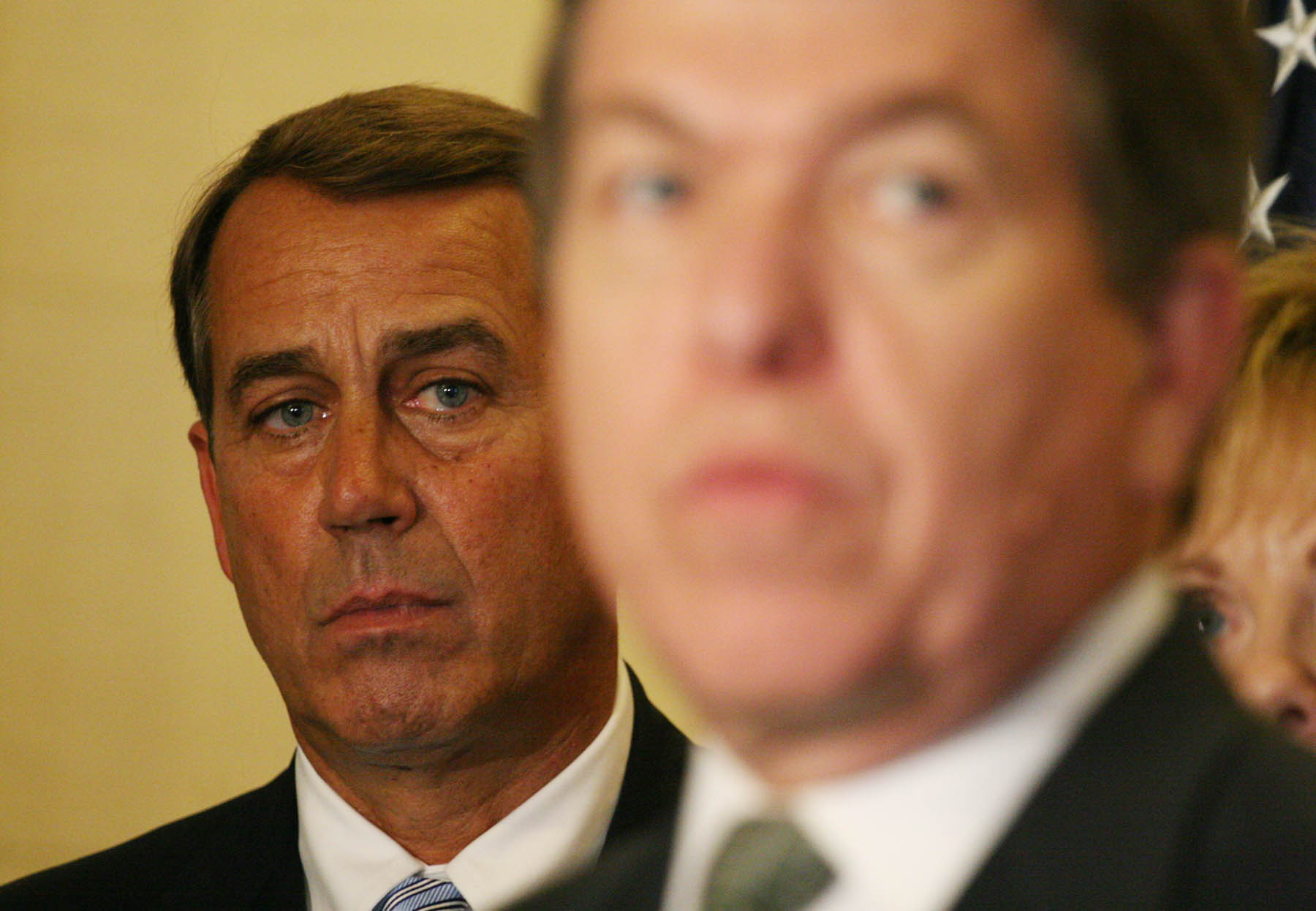The Bailout’s Power Vacuum
The financial bailout bill failed in the House when no one -- not the president, congressional leader or vote counter -- had the influence to save it. What would LBJ have done?
Jul 31, 20202.4K Shares415.2K Views
“„House Minority Leader John Boehner and House Whip Roy Blunt (WDCpix)
As congressional leaders scramble to resuscitate the $700-billion financial bailout plan that died a stunning death in the House this week, many historians and political experts ascribe the bill’s failure to a lack of political leadership in Washington.
This power vacuum was revealed in a lame-duck president who went virtually ignored; congressional leaders who neglected the importance of counting votes; and a slew of lawmakers more concerned with re-election than the fate of the economy.
Indeed, despite pleas from the White House, House leaders and the major presidential candidates, no one had the influence to rally public sentiment — or push the rank-in-file — in support of the bill.
Illustration by: Matt Mahurin
“It’s a crisis of leadership,” said former Rep. Tony Coelho (D-Cal.), a House majority whip for several years in the late 1980s. “The country’s in trouble, and they just didn’t rise up to get this done.”
That diagnosis bucks the conventional wisdom. In the wake of Monday’s vote, Washington’s prognosticators have, at various times, attributed the defeat to public outcry, election-year politicking, ideological entrenchment and even a partisan floor speech just before the vote. Exempting the last, all these factors were certainly in play. Yet the bailout plan has also lacked an influential champion — someone with the credibility to sell its importance, the persuasiveness to unite both parties and the political savvy to secure votes from even the most reluctant lawmakers.
The result: A surprising failure that sent lawmakers scurrying and stocks plunging.
John Morton Blum, history professor emeritus at Yale University and a Roosevelt scholar,” summarized this power vacuum, asking ruefully: “Where are you, Franklin Roosevelt, when we need you?”
Chief among the impotent is President George W. Bush. The bailout strategy — a product of the Treasury Dept. — is essentially his adminsitration’s. Yet he failed miserably to convince even members of his own party to support it. Of the 198 Republicans who voted Monday, only 65 (not even a third) sided with Bush.
“The core of the problem here is the president,” said Julian E. Zelizer, professor of history and public affairs at Princeton University. “He’s a weak, lame-duck president — the worst of all combinations. He can’t mobilize public opinion.”
“Bush is not a lame duck, he’s a dead duck,” offered Blum. “[Herbert] Hoover was about as unpopular, but at least he was intelligent.”
Vice President Dick Cheney, once a powerful influence on Congress’s conservative Republicans, also proved to be an ineffective promoter of the bailout plan. After Cheney stormed the Capitol last week to rally support, Rep. Joe Barton (R-Tex.) summarizedthe meeting with a not-so-subtle rebuke. “I do not appreciate,” Barton said, “being told that I have to vote for something in one week, with no limitations … to solve a problem that the average constituent in my district has never heard of.”
Then there’s Congress. House Minority Leader John Boehner (R-Ohio), who supported the measure, still spent much of the last week disparaging it. At one point, he calledthe plan a “crap sandwich” — hardly a persuasive sell to on-the-fence lawmakers. Instead of urging Republicans to follow his lead, Boehner freed them to vote their consciences. Many did just that — leading, in large part, to the bill’s failure.
“Republicans are just used to having party loyalty carry the day,” said former Sen. Lincoln Chafee (R), now a visiting scholar at Brown University. “It just didn’t happen. The president cried wolf one too many times.”
Of the other actors in the bailout drama, none was convincing enough to push the financial rescue through the House. Speaker Nancy Pelosi (D-Cal.), one of the most liberal members, had only partial influence with keeping fellow liberals in the fold, and even less over the conservatives who fled the bill in droves. Rep. Barney Frank, chairman of the House Financial Services Committee, an openly gay Massachusetts Democrat, commands great respect on financial matters, but his signature abrasiveness is also known to alienate.
Sens. John McCain (R-Ariz.) and Barack Obama (D-Ill.), the presidential contenders, showed only mild support before the vote, with neither coming to Washington to sway votes. And Treasury Sec. Henry Paulson Jr., who crafted the plan, is a former Goldman Sachs CEO, leading to endless criticisms that his blueprint represents Wall Street helping Wall Street — the fox guarding the henhouse.
It wasn’t always this way. Congress has a long history of persuasive giants — lawmakers who got what they wanted despite the better inclinations of those they were asking. In his book“Lyndon B. Johnson and American Liberalism,” Bruce J. Schulman, a history professor at Boston University, relates how one such master was able to secure the passage of favored legislation:
“„LBJ’s legislative strategy rested, as it had during his days as Majority Leader, on his sure and certain knowledge of every congresssman’s needs, inclinations, problems and convictions. When aides told him that they “thought” they had lined up a particular representative’s support, LBJ exploded: “Don’t ever think about those things. Know, know, know! You’ve got to know you’ve got him, and there’s only one way you know.” Johnson looked into his open hand and closed his fingers into a fist. “And that’s when you’ve got his pecker right here.” The president opened his desk drawer, acted as he if were dropping something, emphatically slammed the drawer shut and smiled.
Congressional leaders going into Monday’s House vote hadn’t taken Johnson’s advice, and fell 12 members shy. “This was just a classic case of, ‘You don’t go to a vote unless you know you’ve got them,’” Schulman said in a phone interview Wednesday.
There are other examples. An infamous 2003 voteleading to the creation of Medicare’s controversial prescription drug program, for example, relied on GOP leaders leaving the 15-minute vote open for three hours while they twisted arms on the chamber floor. One tactic of persuasion: House Majority Leader Tom DeLay (R-Texas) offered one reluctant Republican, Rep. Nick Smith (R-Mich), his endorsement of Smith’s son, who was running for his retiring father’s seat.
Coelho suggested that Pelosi and Boehner, in a similar manner, might have prolonged Monday’s vote. “It was only 12 votes,” he said. “Why wasn’t it held open until they got them?”
They will have another chance. The Senate is preparing Wednesday to vote on a slightly modified version of the bailout bill, with the House expecting to vote again Friday if the Senate passes it. Changes include new tax breaks for small businesses, which should inspire more GOP support, though it might also alienate fiscally conservative Democrats, already wary of the cost.
Injecting himself into the debate, Bush delivered yet another message from the White House Tuesday, urging a quick resolution to the stalemate. “It matters little what path a bill takes to become law,” Bush said. “What matters is that we get a law. …The reality is that we are in an urgent situation, and the consequences will grow worse each day if we do not act.”
Despite Bush’s unpopularity, statements like that — combined with an urgency among congressional leaders to forge a passable proposal — gave Wall Street a dose of buoyancy. The Dow Jones Industrial Average leapt 485 points Tuesday, after tumbling 778 points the day before. On Wednesday the Dow held steady, dropping only 19 points.
That rebound might encourage many House Republicans to continue opposing the bailout, which endorses new regulations, effectively raises corporate taxes and represents the greatest government intervention in private markets since the Great Depression.
“For Republicans, this is a mighty hard pill to swallow,” said Wayne Steger political science professor at DuPaul University. “I don’t know if even an LBJ could pull this off.”

Hajra Shannon
Reviewer
Latest Articles
Popular Articles

